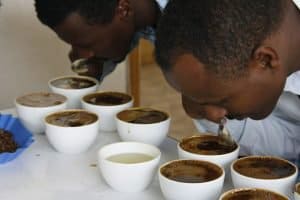 “Specialty coffee” was first used in 1974 by Erna Knutsen in an issue of Tea & Coffee Trade Journal. Knutsen used this term to describe beans of the best flavor which are produced in special microclimates. Specialty coffee is the term commonly used to refer to “gourmet” or “premium” coffee. According to the SCAA, (Specialty Coffee Association of America), coffee which scores 80 points or above on a 100-point scale is graded “specialty.
“Specialty coffee” was first used in 1974 by Erna Knutsen in an issue of Tea & Coffee Trade Journal. Knutsen used this term to describe beans of the best flavor which are produced in special microclimates. Specialty coffee is the term commonly used to refer to “gourmet” or “premium” coffee. According to the SCAA, (Specialty Coffee Association of America), coffee which scores 80 points or above on a 100-point scale is graded “specialty.
The term specialty coffee has extended to include all steps in coffee handling and preparation from growing and harvesting to brewing. Specialty coffee beans need special treatment and handling in order to offer the consumer the best experience.
Here are the most important steps in the specialty coffee supply/preparation chain:
- The origin
- Harvesting
- Processing
- Coffee Roasting
- Grinding
- Coffee Brewing
Specialty coffee shops normally deal on a much smaller scale than big coffee chains such as Starbucks. They are often themselves micro roasters, or partner with micro roasters and they typically serve and prepare coffee of single origin, although carefully considered espresso blends are still popular.
Specialty coffee is often referred to as the “Third Wave of coffee” or simply the “Third Wave coffee movement”, especially in the United States. This refers to the modern consumer demand for very high quality coffee. In some other parts of the world, specialty coffee is simply be known as “Barista coffee”, suggesting that a trained coffee professional, known as a barista, is responsible for coffee brewing and all related drinks in a particular establishment, thus guaranteeing its quality.
Specialty coffee brewing covers all types of coffee preparation but two main focuses for specialty coffee baristas are espresso coffee and pour over filter coffee brewing.